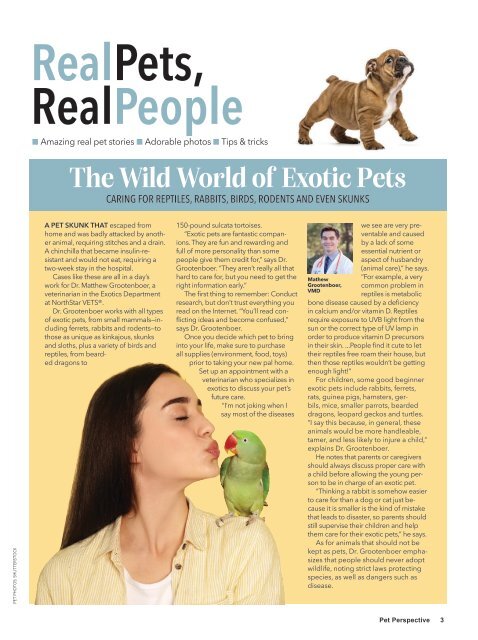2023_NorthStarVets_Pets_Digital_Issue
Create successful ePaper yourself
Turn your PDF publications into a flip-book with our unique Google optimized e-Paper software.
Real<strong>Pets</strong>,<br />
RealPeople<br />
■ Amazing real pet stories ■ Adorable photos ■ Tips & tricks<br />
The Wild World of Exotic <strong>Pets</strong><br />
CARING FOR REPTILES, RABBITS, BIRDS, RODENTS AND EVEN SKUNKS<br />
PET PHOTOS: SHUTTERSTOCK<br />
A PET SKUNK THAT escaped from<br />
home and was badly attacked by another<br />
animal, requiring stitches and a drain.<br />
A chinchilla that became insulin-resistant<br />
and would not eat, requiring a<br />
two-week stay in the hospital.<br />
Cases like these are all in a day’s<br />
work for Dr. Matthew Grootenboer, a<br />
veterinarian in the Exotics Department<br />
at NorthStar VETS®.<br />
Dr. Grootenboer works with all types<br />
of exotic pets, from small mammals—including<br />
ferrets, rabbits and rodents—to<br />
those as unique as kinkajous, skunks<br />
and sloths, plus a variety of birds and<br />
reptiles, from bearded<br />
dragons to<br />
150-pound sulcata tortoises.<br />
“Exotic pets are fantastic companions.<br />
They are fun and rewarding and<br />
full of more personality than some<br />
people give them credit for,” says Dr.<br />
Grootenboer. “They aren’t really all that<br />
hard to care for, but you need to get the<br />
right information early.”<br />
The first thing to remember: Conduct<br />
research, but don’t trust everything you<br />
read on the Internet. “You’ll read conflicting<br />
ideas and become confused,”<br />
says Dr. Grootenboer.<br />
Once you decide which pet to bring<br />
into your life, make sure to purchase<br />
all supplies (environment, food, toys)<br />
prior to taking your new pal home.<br />
Set up an appointment with a<br />
veterinarian who specializes in<br />
exotics to discuss your pet’s<br />
future care.<br />
“I’m not joking when I<br />
say most of the diseases<br />
Mathew<br />
Grootenboer,<br />
VMD<br />
we see are very preventable<br />
and caused<br />
by a lack of some<br />
essential nutrient or<br />
aspect of husbandry<br />
(animal care),” he says.<br />
“For example, a very<br />
common problem in<br />
reptiles is metabolic<br />
bone disease caused by a deficiency<br />
in calcium and/or vitamin D. Reptiles<br />
require exposure to UVB light from the<br />
sun or the correct type of UV lamp in<br />
order to produce vitamin D precursors<br />
in their skin. ...People find it cute to let<br />
their reptiles free roam their house, but<br />
then those reptiles wouldn’t be getting<br />
enough light!”<br />
For children, some good beginner<br />
exotic pets include rabbits, ferrets,<br />
rats, guinea pigs, hamsters, gerbils,<br />
mice, smaller parrots, bearded<br />
dragons, leopard geckos and turtles.<br />
“I say this because, in general, these<br />
animals would be more handleable,<br />
tamer, and less likely to injure a child,”<br />
explains Dr. Grootenboer.<br />
He notes that parents or caregivers<br />
should always discuss proper care with<br />
a child before allowing the young person<br />
to be in charge of an exotic pet.<br />
“Thinking a rabbit is somehow easier<br />
to care for than a dog or cat just because<br />
it is smaller is the kind of mistake<br />
that leads to disaster, so parents should<br />
still supervise their children and help<br />
them care for their exotic pets,” he says.<br />
As for animals that should not be<br />
kept as pets, Dr. Grootenboer emphasizes<br />
that people should never adopt<br />
wildlife, noting strict laws protecting<br />
species, as well as dangers such as<br />
disease.<br />
Pet Perspective 3
















